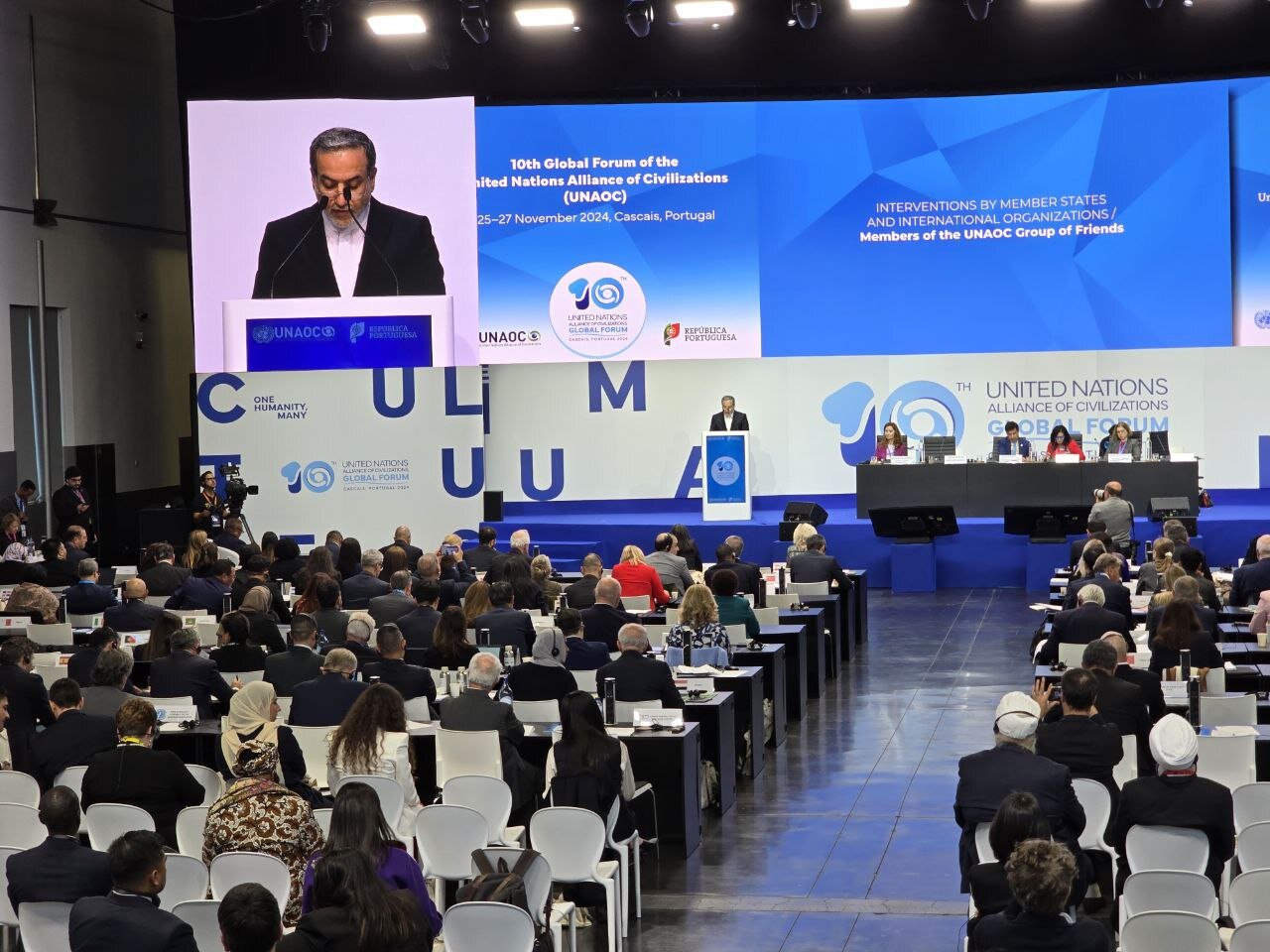TEHRAN – Iranian Foreign Minister Abbas Araghchi participated in the 10th United Nations Alliance of Civilizations (UNAOC) Global Forum in Lisbon, Portugal, on Tuesday.
The event, marking the 20th anniversary of the UNAOC, focused on the theme “United in Peace: Restoring Trust, Reshaping the Future — Reflecting on Two Decades of Dialogue for Humanity.”
The forum gathered diplomats and leaders from around the globe to discuss pressing global challenges, emphasizing the need for increased understanding and cooperation among nations, cultures, and religions.
Before the forum officially began, foreign ministers and heads of delegations posed for a commemorative group photograph, symbolizing their shared commitment to the forum's mission.
During the high-level sessions, Minister Araghchi delivered a comprehensive address outlining Iran’s stance on international peace and security. He also highlighted regional developments, such as ongoing conflicts and the necessity of global cooperation to address shared challenges.
The forum, which concludes on Wednesday, is expected to adopt a final statement underscoring international priorities, including fostering cultural and religious harmony, combating hate speech and racism, addressing Islamophobia, and promoting peace as a universal value.
On the sidelines of the forum, Minister Araghchi held several bilateral meetings to reinforce Iran’s commitment to constructive diplomacy and regional stability.
Tehran, Sarajevo hold bilateral talks
In his first meeting, Araghchi engaged with Elmedin Konakovic, the Foreign Minister of Bosnia and Herzegovina.
The discussions focused on shared interests and the potential for enhanced bilateral and multilateral cooperation.
Araghchi emphasized Iran’s ongoing dedication to fostering stronger ties, particularly with Islamic nations, and highlighted Iran’s readiness to expand collaborations across various sectors.
Addressing the region’s current crises, Araghchi condemned the actions of the Zionist regime in West Asia, including its aggression against Lebanon and the ongoing plight of Palestinian Muslims.
He stressed the urgency of mobilizing international efforts to halt these violations and ensure justice and security for affected populations.
Since October 2023, the Gaza Health Ministry reports that the death toll in Gaza has reached 44,249 Palestinians, with over 104,746 others injured.
Israel, which has been engaged in military campaigns against Gaza and Lebanon, is now facing genocide allegations at the International Court of Justice (ICJ).
Additionally, the International Criminal Court (ICC) has issued arrest warrants for Israeli Prime Minister Benjamin Netanyahu and former Defense Minister Yoav Gallant, accusing them of war crimes and crimes against humanity.
Iran, Slovenia discuss international issues
Araghchi also met with Slovenia’s Foreign Minister, Tanja Fajon, to discuss bilateral relations, regional developments, and broader international issues, including Iran-Europe relations.
He reiterated Iran’s principled stance on engagement and multilateral cooperation, underscoring the importance of adhering to recognized international norms.
In his remarks, Araghchi criticized sanctions and unilateral pressures as both ineffective and contrary to the UN Charter.
He urged collective efforts to confront shared challenges and called for global responsibility, particularly among countries supporting Israel, to halt the regime's violations and its threat to regional peace.
Fajon, recognizing Iran’s pivotal role in West Asia, echoed the need for greater international collaboration to prevent further instability and insecurity in the region.
Solidarity among UN states necessary to halt Israeli crimes: Araghchi
In another bilateral meeting, Araghchi held talks with Spanish Foreign Minister José Manuel Albares.
He emphasized the necessity of solidarity among UN member states to prevent the ongoing genocide by the Zionist regime in Lebanon and Gaza.
Through his participation and bilateral meetings, Minister Araghchi showcased Iran’s proactive role in addressing global issues and fostering dialogue as a path to peace.
The UNAOC was founded in response to mutual suspicion, fear and polarisation between Muslim countries and Western societies, with the understanding that only a broad coalition could prevent the situation from deteriorating further, which had begun to threaten international stability.
The UNAOC aims to counteract this trend through mutual respect among diverse cultures.
Under the UN framework, the UNAOC Friends Group, which includes countries and international organizations, has grown to 158 members.
The UNAOC summit was initiated by José Luis Rodríguez Zapatero, the former Prime Minister of Spain, during the 59th session of the United Nations General Assembly in 2005.
The UNAOC’s highest level political activities are the periodic Global Forums.
The previous Global Forum took place in Fes, north-eastern Morocco, on 22-23 November, 2022.


No comments:
Post a Comment